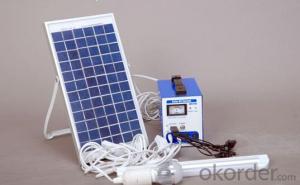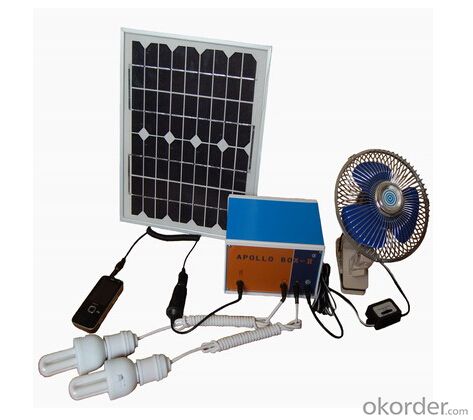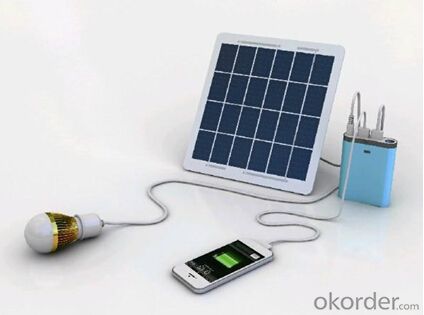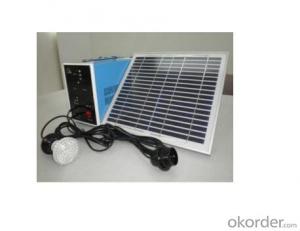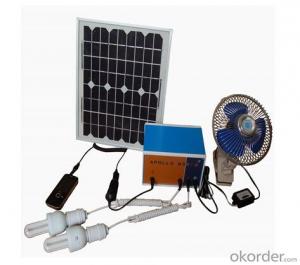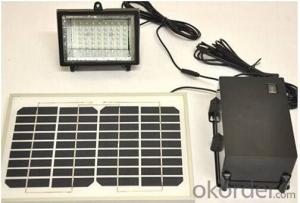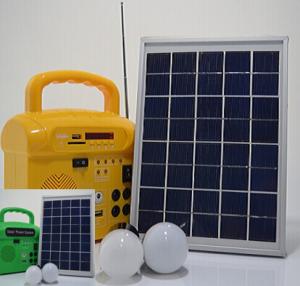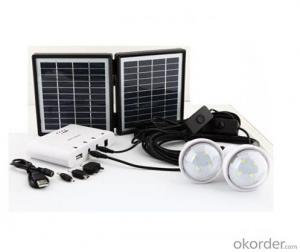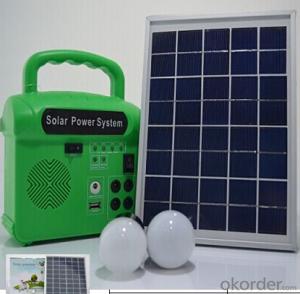American Solar Energy Systems CNBM Solar Home System Roof System Capacity-20w-3
- Loading Port:
- Shanghai
- Payment Terms:
- TT or LC
- Min Order Qty:
- 10 m
- Supply Capability:
- 30000 m/month
OKorder Service Pledge
OKorder Financial Service
You Might Also Like
Introduction of Solar Home System
Solar Home System is composed by Solar Panels, Inverters, Charger Controller, Battery, Cable, Mounting Bracket, which is applied to produce electricity for home use.
Solar Home System is quite suitable product in urban area and the place which is short of electricity. Our Small Solar Home System own great benifits compare with other kind electricity resources:
Electricity generating cost of Solar Home System is much cheaper than diesel engine. Beside low electricity making cost, solar system products also have the features of noiseless, clean energy, environmentally friendly and can access to many different electric appliance.
Working Principle of Solar Home System
The stand alone Solar Home System is an off-grid solar system which uses batteries to store the solar energy. Stand alone solar system solutions design for those who are not able or willing to connect to electricity grid.
However, our on-grid solar home system can be connected to the grid for utilization of grid electricity power. Our solar system can add relative equipment as our customer’s requirement which have the function of switching to city electricity automatically. The solar system can use battery power in priority, if sunshine is not so good or loads consumption is too high which cause battery power insufficient. Then system can switch automatically to grid power supply. Meanwhile, the system can charge the batteries with grid power until batteries are fully charged. Then the solar system will switch back to battery power supply.
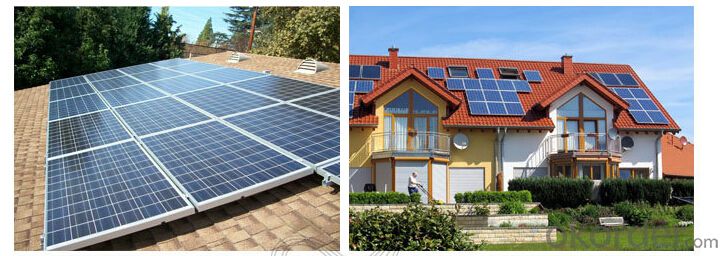


Advantage of Our Solar Home System
1 Excellent Performance: Our Solar Home System is composed by Brand Standard Kits with high quality. Our solar system has the advantage of high efficiency and stable operation. We can ensure our product with a long life period.
2. Small Orders Accepted: We can accept small orders as our customer’s trial order.
3. Warehouse: We have warehouse overseas which can bring great convenience to our customer to pick up the products.
Terms and Conditions
1. Trade terms: FOB Shanghai
2. Payment terms: 30% T/T, balanced before shipment/ LC at sight before shipment. Actual Terms can be negotiated for big order.
3. Package: Exported standard package suitable for tough handling and sea transport.
4. Delivery: Goods to be ready within 10~30 days depending on order quantity.
5. Warranty: 10 years for solar panel, 2 years for controller/inverter/battery.
- Q: How does the angle of solar panels affect their efficiency?
- The angle of solar panels significantly affects their efficiency. The optimal angle is generally determined by the geographical location and time of year. If the angle is too steep, the panels may not receive enough sunlight, leading to reduced efficiency. Similarly, if the angle is too shallow, the panels may not capture sunlight effectively. Therefore, adjusting the angle of solar panels to maximize sunlight exposure is crucial for optimizing their efficiency.
- Q: What is net metering and how does it work with solar energy systems?
- Net metering is a billing arrangement that allows solar energy system owners to receive credit for the excess electricity they generate and feed back into the grid. With net metering, when a solar energy system produces more electricity than is being consumed, the excess energy is sent back to the power grid, and the homeowner or business owner receives a credit on their utility bill. This credit can then be used to offset the cost of electricity when the solar system is not generating enough power, such as during nighttime or cloudy days. Essentially, net metering ensures a fair and efficient exchange of electricity between the solar system owner and the utility company, making solar energy systems more economically viable and accessible.
- Q: How do I maintain a solar energy system?
- To maintain a solar energy system, regular cleaning and inspection of the panels is crucial. Remove any debris or dirt that may obstruct sunlight absorption. Additionally, check the wiring and connections periodically to ensure they are secure and free from damage. Monitor the system's performance and keep track of any changes in energy production. Lastly, it is advisable to schedule professional maintenance once or twice a year to address any potential issues and optimize the system's efficiency.
- Q: Can solar energy systems be used in powering swimming pools or spas?
- Certainly, swimming pools or spas can be powered by solar energy systems. Solar pool heating systems harness the sun's energy to warm the water in the pool or spa, presenting a more sustainable and economical option compared to traditional heating methods. Typically, these systems comprise solar collectors, a pump, and a filter. The solar collectors, typically positioned on the roof or ground, absorb sunlight and transfer its warmth to the pool water. The pump circulates the water through the collectors and returns it to the pool, ensuring a continuous flow of heated water. By utilizing a renewable energy source, solar energy systems for swimming pools and spas not only lower energy expenses but also contribute positively to the environment.
- Q: How do solar energy systems affect wildlife?
- Solar energy systems can have both positive and negative effects on wildlife. On one hand, solar panels do not produce air or water pollution, reducing the negative impacts on ecosystems. Additionally, solar farms can provide new habitats for certain species, particularly if the land was previously unused or disturbed. On the other hand, large-scale solar projects can disrupt natural habitats, displacing or disturbing wildlife populations. Moreover, solar panels can also pose threats to birds, as they may collide with the reflective surfaces. However, with proper planning and implementation, such negative impacts can be minimized, making solar energy systems a more sustainable choice for both humans and wildlife.
- Q: Can solar energy systems be installed on roofs?
- Solar energy systems can indeed be placed on roofs. In fact, rooftops are a popular choice for solar panel installations. One key benefit of installing solar panels on roofs is that they make use of existing space, eliminating the need for extra land. Moreover, rooftop solar installations offer the advantage of being unimpeded by shade caused by trees or buildings, maximizing sun exposure and electricity generation. Additionally, rooftop installations often prove cost-effective, as they reduce the requirement for long-distance transmission lines and directly supply power to the building. All in all, installing solar energy systems on roofs is a pragmatic and effective means of harnessing clean, renewable energy.
- Q: How does the size of a solar energy system affect its cost?
- The cost of a solar energy system is influenced by its size. In general, the larger the system, the more it will cost. Several factors determine the cost, including the number of solar panels, the type and quality of the panels, the capacity of the inverter, the mounting equipment, and the labor required for installation. The number of solar panels is a crucial factor in calculating the cost. Solar panels are the primary source of energy generation in a solar system. The more panels you install, the more energy the system will produce. However, each additional panel adds to the overall cost, including the cost of the panel itself, the additional wiring, the mounting hardware, and the labor needed for installation. Another factor to consider is the type and quality of the solar panels. Different panels have varying efficiencies, durability, and warranties. Higher-quality panels with better efficiency are typically more expensive. However, they often come with longer warranties and can generate more electricity over their lifespan, resulting in greater overall savings. The capacity of the inverter is also important in determining the cost. Inverters convert the direct current from the solar panels into alternating current that can be used to power household appliances. Larger solar systems usually require larger inverters to handle the increased energy production. Higher capacity inverters come at a higher cost, which contributes to the overall system cost. The cost is also affected by the mounting equipment and labor required for installation. Larger systems may require more mounting equipment, such as racks and brackets, to securely hold the solar panels. Furthermore, the labor cost for installation increases with the system's size because it takes more time and effort to install a larger number of panels. It is worth noting that although a larger solar energy system may have a higher upfront cost, it can lead to greater long-term savings by reducing electricity bills. A larger system generates more electricity, potentially offsetting a greater portion of your energy needs and reducing your reliance on grid electricity. In conclusion, the size of a solar energy system directly influences its cost. The number of panels, type and quality of panels, inverter capacity, mounting equipment, and installation labor all contribute to the overall cost. It is crucial to carefully consider your energy needs and budget when determining the appropriate size of a solar energy system for your specific requirements.
- Q: Can solar energy systems be used in powering government buildings or offices?
- Government buildings or offices can definitely utilize solar energy systems as a means of power. In fact, numerous governments across the globe have already embraced solar energy as a sustainable and cost-effective solution to fulfill their electricity needs. There are multiple reasons why solar energy systems are highly suitable for government buildings or offices. Firstly, these buildings often possess spacious rooftops or open areas that are well-suited for the installation of solar panels. These panels have the ability to convert sunlight into electricity, which can then be utilized to power the buildings' lighting, HVAC systems, and other electrical appliances. Secondly, solar energy systems offer substantial cost savings in the long run. Although the initial investment may be higher in comparison to traditional energy sources, solar panels have a long lifespan and require minimal maintenance. This makes them a financially appealing option for government agencies, as they can reduce their dependence on costly grid electricity and save taxpayer money over time. Moreover, by utilizing solar energy, government buildings can significantly diminish their carbon footprint and contribute to environmental sustainability. Solar power is a clean and renewable energy source that generates no greenhouse gas emissions during operation. This aligns with the global efforts to combat climate change and achieve sustainability goals. Furthermore, solar energy systems can also serve as a reliable source of electricity, especially when combined with energy storage technologies like batteries. This ensures that government buildings or offices have a continuous power supply, even during grid outages or emergencies. In conclusion, solar energy systems are a practical and advantageous choice for powering government buildings or offices. They offer a multitude of benefits, including cost savings, environmental sustainability, and reliable electricity supply. As governments worldwide strive to transition to clean energy sources, solar power is increasingly gaining popularity as an ideal option for powering government infrastructure.
- Q: Can solar energy systems be easily expanded or upgraded?
- Yes, solar energy systems can be easily expanded or upgraded. One of the major advantages of solar technology is its modular nature, allowing for scalability and flexibility. If you have additional space available, you can simply add more solar panels to increase the capacity of your system. Additionally, advancements in solar technology have made it easier to integrate new panels with existing systems. Upgrading a solar energy system can also be done by replacing older or less efficient components with newer and more efficient ones, such as upgrading to higher capacity inverters or adding battery storage for energy storage purposes. The expandability and upgradability of solar energy systems make them a cost-effective and sustainable choice for meeting increasing energy demands over time.
- Q: How much energy can a solar energy system produce?
- The amount of energy a solar energy system can produce depends on various factors such as the size and efficiency of the system, location, weather conditions, and available sunlight. On average, a typical solar energy system can produce anywhere from 1 to 10 kilowatt-hours (kWh) of electricity per day for every installed kilowatt (kW) of solar panels. For example, a 5 kW solar energy system can generate around 5 to 50 kWh of electricity per day, which can be enough to power the average household's energy needs. However, it is important to note that this energy production can vary throughout the year due to seasonal changes in sunlight availability and weather conditions. Moreover, advancements in solar technology and increased efficiency of solar panels have led to significant improvements in energy production. High-performance solar panels and optimized system designs can generate even more electricity, maximizing the energy output of a solar energy system. Additionally, excess energy produced by a solar energy system can be stored in batteries for later use or fed back into the grid, depending on the specific setup and local regulations. This allows for further utilization and optimization of solar energy production. Ultimately, the potential energy production of a solar energy system is a dynamic and customizable aspect that can be tailored to individual energy needs and goals. Consulting with a solar energy professional can provide more accurate estimates and help design a system that best meets specific requirements.
Send your message to us
American Solar Energy Systems CNBM Solar Home System Roof System Capacity-20w-3
- Loading Port:
- Shanghai
- Payment Terms:
- TT or LC
- Min Order Qty:
- 10 m
- Supply Capability:
- 30000 m/month
OKorder Service Pledge
OKorder Financial Service
Similar products
Hot products
Hot Searches
Related keywords
